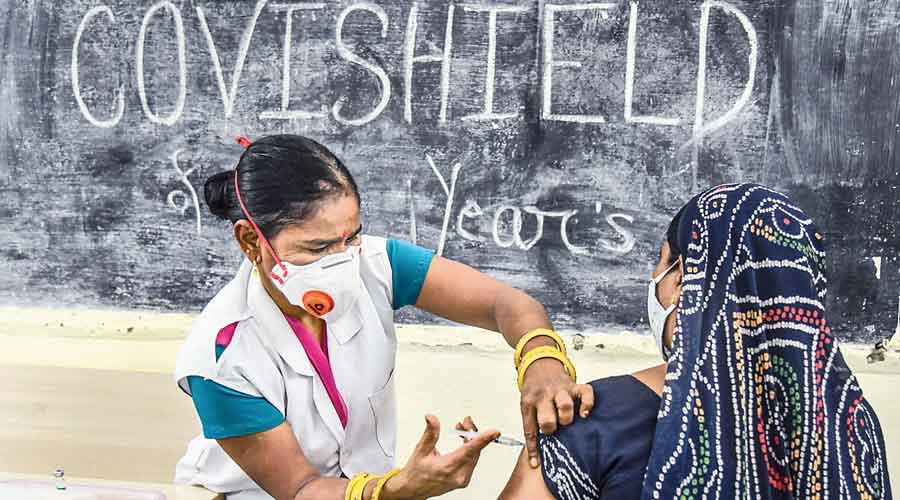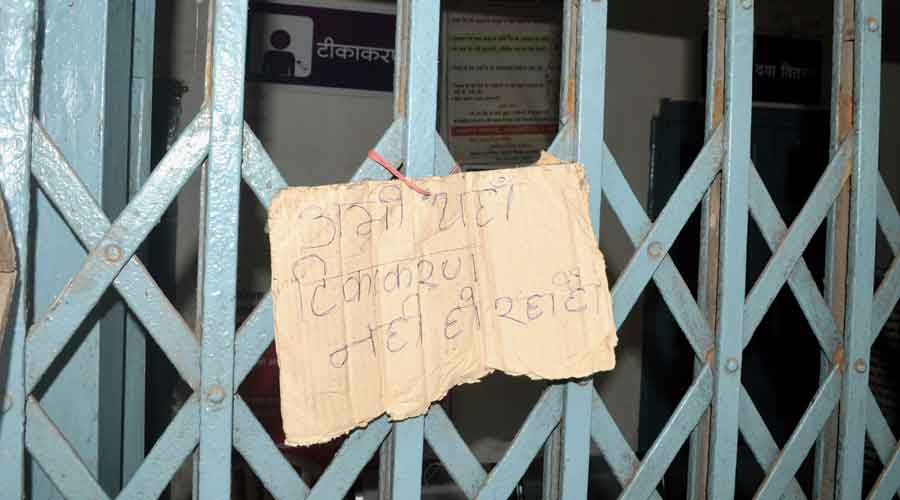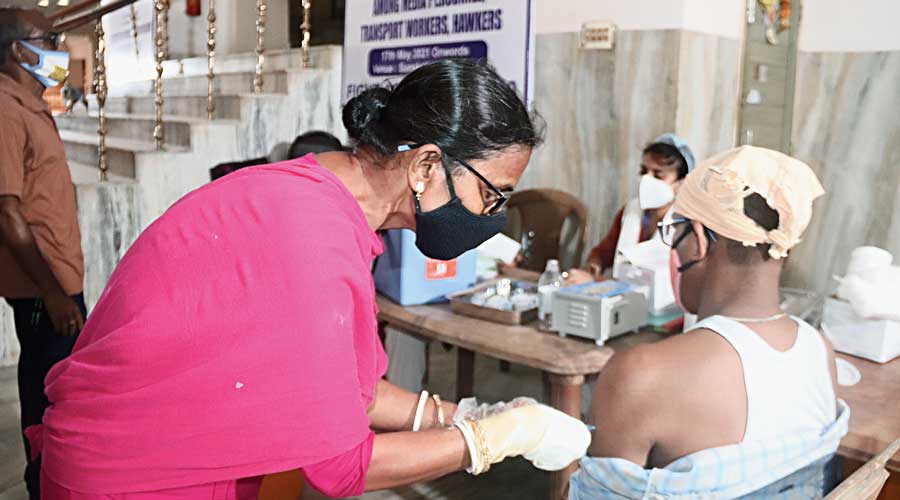With a projected population of 136.3 crore, India had fully vaccinated only around 4.3 per cent of its population till June 30. India’s Covid-19 vaccination rate currently stands at 24 doses administered per 100 people. This lags significantly behind the Asian and South American continental average of over 40 doses per 100 people, let alone the European and North American rates of 67 and 72.
In this gloomy backdrop, and after being censured by the Supreme Court for its “arbitrary and irrational” paid vaccination policy for people aged between 18 and 45, the Narendra Modi government now claims that a “new phase of universalisation of Covid-19 vaccination” has started from June 21, with free-of-cost delivery to the states and streamlining of the supply chain having led to a ramped-up vaccination drive.
Are these claims credible? Can the Centre ensure full vaccination of the 18-plus population by the end of 2021, as projected before the Supreme Court? Why has the daily vaccination rate dropped from over 90 lakh on June 21 to below 28 lakh on June 30? The answers are to be found in the vaccine procurement data.
The data submitted by the Union health ministry in its June 26 affidavit before the Supreme Court remains quite opaque. A closer scrutiny of the official projections in the affidavit reveals that the Centre has been able to procure only 35.6 crore doses of Covishield (27.6 crore) and Covaxin (8 crore) combined. A total of 33.57 crore doses had already been administered by June 30, which means the vaccine inventory is almost exhausted.
The Centre’s affidavit makes a projection of 51.6 crore vaccine doses by July 31, based on a further 16 crore doses, which “will also be available during the period of May 2021 & July 2021 across the country”. This projection is quite wobbly. The affidavit states that an advance 30 per cent payment of Rs 2,079 crore has been made for the next tranche of 44 crore vaccines (25 crore Covishield doses and 19 crore Covaxin doses).
The delivery of this tranche was to start from August, according to an earlier procurement plan. Now, in a rescheduled plan, the Centre expects 14 crore doses from this tranche to be delivered by July 31. Additionally, 2 crore doses of Sputnik V from Russia are expected by end-July, of which only 31 lakh doses have been delivered.
Accordingly, an allocation of 12 crore vaccine doses has been made across all states for July, 9 crore of which would be supplied free of cost and the remaining 3 crore will be for private facilities, under the Centre’s 75-25 formula. However, if the vaccine producers are unable to meet the revised targets and deadlines, severe shortages will appear in July itself, derailing the official projections.
Universal vaccination for India’s adult population, which is officially projected at 94.47 crore, implies a total requirement of 189 crore vaccine doses. The Centre’s Supreme Court affidavit sets an overall target of 186.6 crore. After making a tentative projection of 51.6 crore by July-end, another projection of 135 crore vaccine doses between August and December has been presented.
The supply break-up of these 135 crore doses has been provided as 50 crore Covishield doses, 40 crore Covaxin doses, 30 crore doses of Biological E’s Corbevax, 5 crore does of the Zydus Cadila DNA vaccine, and 10 crore Sputnik V doses.
None of these production targets appears feasible, going by the production and supply trends of June. The largest supplier, the Serum Institute of India, reportedly supplied 6.5 crore Covishield doses in May and another 10 crore in June. As for Covaxin, only 8 crore doses have been supplied till June. Is it feasible to expect them to supply another 104 crore doses between July and December, which means supplying over 17 crore doses a month?
As for Biological E’s Corbevax, production is yet to begin. Expecting the company to supply 5 crore vaccines a month from July is impractical. It is easily conceivable that all these targets would be missed, jeopardising the entire vaccination programme and leaving a very large section of the Indian population vulnerable to the third wave of the pandemic.
What is required today is not a catalogue of wishful thinking, which the Centre has submitted to the Supreme Court, but an executable plan. This would imply either of two things.
If the government insists on vaccinating the entire 94.47 crore adult population by December, within the Rs 35,000 crore budgeted for 2021-22, it would require a massive mobilisation of domestic production capacity. Not only should the idle facilities of vaccine-producing public sector units across the country be used, as in wartime, new vaccine production facilities must be created by converting other facilities into vaccine-producing units.
In response to RTI queries from one of the authors of this article (dated June 28), the Union health ministry cited the cost of procurement as Rs 157.50 per vaccine dose, including GST. The possibility of new domestic corporate players being even interested in, let alone capable of, producing 150-crore-plus vaccine doses at this price in the next six months is zero.
The only other available option involves negotiations with foreign vaccine suppliers like Pfizer, Johnson & Johnson, Moderna, etc, which the Centre’s Supreme Court affidavit suggests are already at an “advanced stage” with the involvement of the “highest political executive”.
That nothing has materialised so far from those efforts, however, is evident from the health ministry’s RTI response, which states that out of the Rs 35,000 crore budget outlay, the total expenditure on vaccine procurement by end-June, including advance payments, is only Rs 8,067.75. The Centre has not even been able to place purchase orders so far, let alone ensure procurement of vaccines from abroad, other than a small quantity of Sputnik V.
The reason for this is simple. The MNC suppliers are currently charging around $10 per vaccine dose, while India’s budgetary allocation permits a maximum procurement price of $2.5 per dose. International procurement would therefore entail a massive increase in the vaccination budget.
If atmanirbharta (self-reliance) is to be the policy cornerstone, that can only be attained with a leading role played by public enterprises and the government taking proactive and intelligent decisions regarding the allocation and pricing of resources — neoliberal dogma about governments having nothing to do with production and businesses needs to be abandoned.
On the other hand, if utilitarianism has to prevail in this case, since it involves the right to life of millions of Indian citizens, then the fisc or the taxpayers need to bear the cost; fiscal conservatism cannot come in the way of adequate outlays for Covid-19 vaccinations.
The Narendra Modi government’s current procurement and vaccination plan appears to be falling between these two stools. If the government cannot resolve this dilemma, the Supreme Court will have to step in to secure the lives of millions of Indians and ensure their vaccination by end-December 2021.
Prasenjit Bose is an economist and activist based in Calcutta; Indranil Chowdhury teaches economics at PGDAV College, Delhi University













